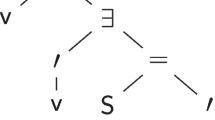Abstract
The rediscovery of Aristotle’s works on syllogisms in the Latin world, especially the Sophistici Elenchi and then the Prior Analytics, gave rise to sophisticated views on the nature of syllogistic form and syllogistic matter in the thirteenth century. It led to debates on the ontology of the syllogism as studied in the Prior Analytics, i.e. the syllogism made of letters and the four logical constants a/e/i/o, with deep consequences on the definition of logic as a universal method for all sciences and as a science itself.
Similar content being viewed by others
References
Albert the Great: Liber Elenchorum. In: Borgnet, A. (éd.) Opera Omnia, vol. II. Vives, Paris (1890)
Albert the Great: Super Porphyrium de V universalibus. In: Santos Noya, M. (éd.) Opera Omnia, vol. 1/1. Aschendorff, Münster (2004)
Alexander of Aphrodisias: In: Wallies, M. (éd.) Aristotelis Analyticorum priorum librum I commentarium. CAG II/1. Reimer, Berlin (1883)
Barnes, J.: Logical form and logical matter. In: Alberti, A.M. (ed.) Logica, mente e persona, pp. 7–119. Olschki, Florence (1990)
Barnes, J.: Proof and the syllogism. In: Berti, E. (ed.) Aristotle on Science and the Posterior Analytics, pp. 17–60. Antenore, Padova (1981)
Béziau, J.-Y.: Preface. Logica Universalis: Towards a General Theory of Logic, pp. VII–X. Birkhäuser Basel (2005)
Béziau J.-Y.: 13 Questions about universal logic. Bull. Sect. Log. 35, 133–150 (2006)
Béziau, J.-Y.: What is “formal logic? In: Myung-Hyun-Lee (ed.) Proceedings of the XXII World Congress of Philosophy, vol. 13, pp. 9–22. Korean Philosophical Association, Seoul (2008)
Brumberg-Chaumont, J.: Form and Matter in the Anonymus Cantabrigiensis. In: Bydén, B., Thomsen Thörnqvist, Ch. (eds.) The Aristotelian Tradition: The Reception of Aristotle’s Works on Logic and Metaphysics in the Middle Ages. Pontifical Institute of Medieval Studies, Toronto (2015, forthcoming)
Brumberg-Chaumont, J.: La forme syllogistique et le problème des syllogismes sophistiques selon Robert Kilwardby. In: Cesalli, L., Goubier, F., De Libera, A. (eds.) Formal Approaches and Natural language in Medieval Logic. Brepols, Turnhout (2015, forthcoming)
Brumberg-Chaumont, J.: Les divisions de la logiques selon Albert le Grand. In: Brumberg-Chaumont, J. (ed.) Ad Notitiam ignoti. L’Organon dans la translato studiorum à l’époque d’Albert le Grand, pp. 335–416. Brepols, Turnhout (2013)
Commentarii Collegii Conimbricensis Societate Jesu: in vniversam dialecticam. Coloniae Agrippinae (1630)
Corcoran, J. (ed.): Aristotle’s natural deduction system. In: Ancient Logic and its Modern Inrerpretations, pp. 85–131. Springer, Dordrecht (1974)
Dutilh Novaes C.: Reassessing logical hylomorphism and the demarcation of logical constants. Synthese 185, 387–410 (2012)
Dutilh Novaes, C.: Logic in the 14th century after Ockham. In: Gabbay, D., Woods, J. (eds.) Handbook in the History of Logic, Medieval and Renaissance Logic, pp. 474–477. Elsevier, Amsterdam (2008)
Ebbesen, S.: Analysing syllogims or Anonymus Aurelianensis III, the (presumably) Earlier Latin Commentary on the Prior Analytics and its Greek Model. In: Greek–Latin Philosophical interactions, vol. 1, pp. 171–187 (2008)
Ebbesen, S.: Anonymous Aurelianensis II, Aristotle, Alexander, Porphyry and Boethius: ancient scholasticism and 12th century Western Europe. In: Cahiers de l’Institut du Moyen Âge Grec et Latin, vol. 16 (1976)
Ebbesen, S.: Anonymi Aurelianensis I Commentarium in Sophisticos Elenchos. Cahiers de l’Institut du Moyen Âge Grec et Latin, vol. 34 (1979)
Ebbesen, S.: Commentators and Commentaries on Aristotle’s Sophistici Elenchi: a Study of Post-Aristotelian Ancient and Medieval Writings on Fallacies, vol. 3. Brill, Leiden (1981)
Flannery K.: A Way into the Logic of Alexander of Aphrodisias. Brill, Leiden (1995)
Frede, M.: Stoic vs. Aristotelian Syllogistic. Archiv für Geschichte der Philosophie 56(1), 1–32 (1974) (Reprint in Collected Papers, 1987)
Hugonnard-Roche, H.: La logique d’Aristote du grec au syriaque. Études sur la transmission des textes de l’Organon et leur interprétation philosophique. Vrin, Paris (2004)
Kirwan Ch.: Logic and Argument, Duckworth. Duckworth, New York (1978)
Mac Farlane, J.: What does it mean to say that logic is formal? PhD Dissertation, University of Pittsburgh (2000). http://johnmacfarlane.net/diss.html
MacFarlane, J.: Logical constants. In: Zalta, E. (ed.) Stanford Encyclopedia of Philosophy. http://plato.stanford.edu/entries/logical-constants/
Martin, Ch.: Logic. In: Brower, J.E., Guilfoy, K. (eds.) The Cambridge Companion to Abelard, pp. 200–222. Cambridge University Press, Cambridge (2004)
Piché, D.: “La notion de Forma totius chez Albert le Grand, ses contemporains et ses sources. In: Brumberg-Chaumont, J. (ed.) Ad Notitiam Ignoti, l’Organon dans la translatio studiorumà l’époque d’Albert le Grand, pp. 417–446. Brepols, Turnhout (2013)
Robertus Kilwardby: De Ortu scientiarum. In: Judy, A. (ed.) British Academy, London (1976)
Robertus Kilwardby: Expositio Egidii Romani super libros priorum Analeticorum Aristotelis cum textu euisdem. In: Green-Pedersen, N.J. (éd.) Discussions about the Status of the Loci Dialectici in Works from the Middle or the 13th Century. CIMAGL, vol. 20, pp. 38–78 (1977)
Robertus Kilwardby: Liber Elenchorum. Ms Paris BnF, lat 16619, fol. 1ra-71vb
Silva, J.F.: Robert Kilwardby on the Theory of Soul and Epistemology. In: [33], pp. 275–314
Smith R.: Aristotle’s Prior Analytics. Hackett publishing company, Indianapolis (1989)
Striker, G.: Aristotle’s Prior Analytics, Book 1. Oxford University Press, Oxford (2009)
Thom, P., Lagerlund, H. (eds.) A Companion to the Philosophy of Robert Kilwardby. Brill, Leiden/Boston (2013)
Thom, P.: Logic and Ontology in the Syllogistic of Robert Kilwardby. Brill, Leiden/Boston (2007)
Thom, P.: Robert Kilwardby on Syllogistic Form. In: [33], pp. 131–163
Thom, P.: The syllogism and its transformations. In: Dutilh Novaes, C., Read, S. (eds.) The Cambridge Companion to Medieval Logic. Cambridge University Press, Cambridge (2015, forthcoming)
Thomsen Thörnvisq, C.: Anonymus Aurelianensis III on Aristotelis Analytica priora. In: Thomsen Thörnqvist, C. (ed.) Studien und Texte zur Geistesgeschichte des Mittelalters, vol. 115. Brill, Leiden/Boston (2015, forthcoming)
Weijers, O.: Le commentaire sur les Topiques d’Aristote attribué à Robert Kilwardby (ms Florence, B.N.C., Conv. Soppr. B. 4. 1618). Documenti e Studi sulla tradizione filosofica medievale, vol. VI, pp. 107–143 (1995)
Author information
Authors and Affiliations
Corresponding author
Rights and permissions
About this article
Cite this article
Brumberg-Chaumont, J. Universal Logic and Aristotelian Logic: Formality and Essence of Logic. Log. Univers. 9, 253–278 (2015). https://doi.org/10.1007/s11787-015-0123-y
Received:
Accepted:
Published:
Issue Date:
DOI: https://doi.org/10.1007/s11787-015-0123-y



